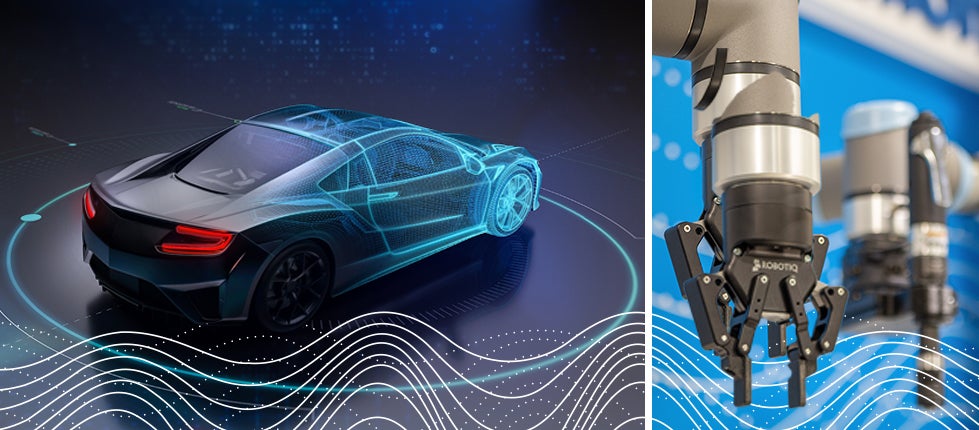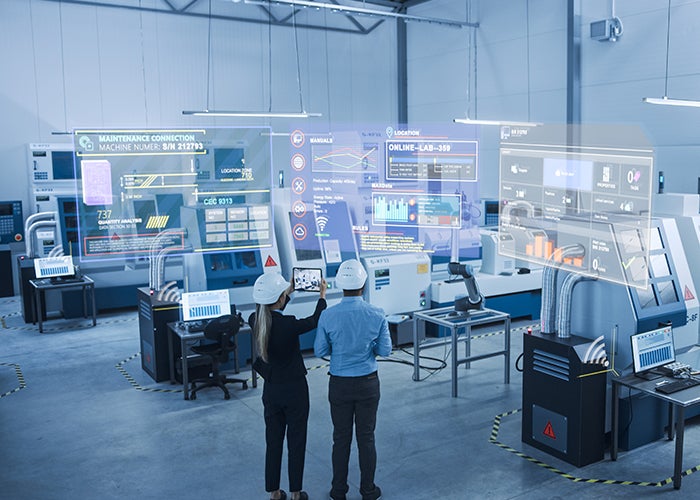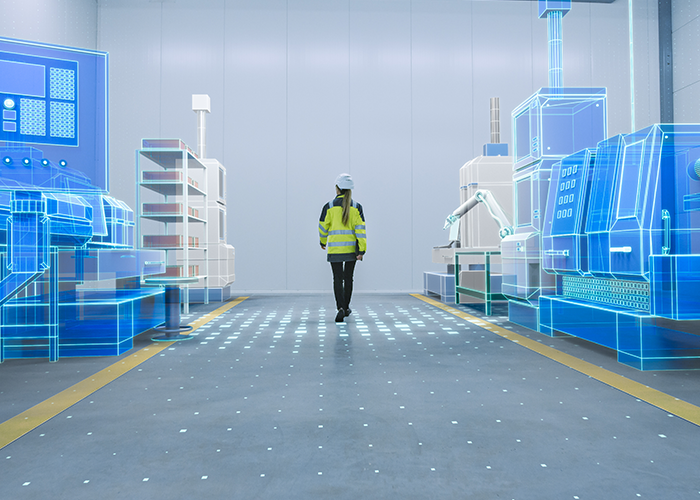
The automotive industry is experiencing a massive transformational shift to the next generation of mobility. From the fast growth of electric vehicles (EVs) to the proliferation of software-defined vehicles, the industry’s transformation requires rapid technological advancements, increased scalable computing platforms, and new business models in how manufacturers and suppliers will work together.

Against this backdrop, Industry 4.0 enables greater productivity and quality in automotive manufacturing. A 2022 McKinsey & Company article stated that “manufacturers in industries such as automotive and electronics, nearing the tipping point of digital adoption, are achieving even faster and more sustainable change through Industry 4.0.”
The 2023 Deloitte Automotive Supplier Study also identified opportunities within the industry to streamline operating costs and introduce efficiencies, calling out that “suppliers can also look to make critical investments in technology and automation that will unlock even leaner manufacturing processes and set the foundation for long-term competitiveness.”
In the automotive industry, leveraging advanced manufacturing technologies — such as Artificial Intelligence (AI), automation, robotics, simulation, digital twin, and others — enable manufacturers to deliver differentiated products at scale with efficiency, agility, and speed.
Driving automotive manufacturing excellence early in the product lifecycle
At Flex, we use Industry 4.0 technologies like modeling and simulation early in the product lifecycle to ensure that our automotive customers can be assured of greater efficiency and lower risk further down the line when they’re producing at scale. For example, within design for manufacturing (DfM), modeling and simulation are used to determine how to achieve the highest yield with the fastest cycle times well before a product reaches the manufacturing stage. DfM guidance helps companies ensure that product designs are manufacturable, eliminating scrap and bottlenecks while maximizing product performance.
Another big benefit of simulation in the automotive industry is during the production part approval process (PPAP), which is a strict documented process that ensures products delivered to customers meet their requirements for performance, quality, and delivery. At Flex, we use simulation to speed this process, building out production flows in software iteratively until we can be confident that we have the required capacity and capabilities before we build products in real life.
This approach saves months of time and resources, enabling automotive manufacturers to accelerate next-generation mobility while maintaining quality, safety, and resiliency. We are also able to streamline serial production by gathering early input into the process failure mode and effects analysis (PFMEA). By simulating production lines and processes, we can quickly identify areas of highest risk and key bottlenecks and then develop and implement risk mitigation strategies in advance.
Applying AI for improved efficiency and quality
From factory line optimization to predictive maintenance and anomaly detection, AI offers many benefits to manufacturing processes. AI can help collect, analyze, and detect machine issues on the factory floor before they happen. With significant upstream data from connected machines, AI models can predict when an adverse event might happen, allowing manufacturers to prevent failures and mitigate downtime.
For example, at Flex, we applied AI on a line that had two almost identical capacitors. The only difference between the two components was the valves, which made it challenging for the human eye to detect anomalies. This was a critical area of concern because if the wrong capacitor was used, the product wouldn’t operate.
By using visual data and AI, our systems were able to identify if an employee placed the components in the correct spot and provide resolutions to fix issues in real-time. This translated to greater performance and yield, and enabled Flex to reduce scrap by identifying issues before a part was sent to another step in the line.
Digital twins and closed-loop feedback for process innovation
Digital twins — which represent cyber-physical systems where information flows between the simulation and the physical world — enable the next level of optimization in product design and manufacturing processes. This closed-loop approach allows for precise modeling, quality assurance, and optimization of complex manufacturing processes in the automotive industry, where safety and reliability are paramount. In an increasingly chaotic world, digital twins also allow manufacturers to quickly understand the true risk and impacts of disruptions.

For example, automotive manufacturers can simulate line flow to understand the potential effect of shortages and other challenges, then identify alternatives and optimizations to limit the impact. This helps accelerate the change process and validates changes before implementation, resulting in cost and time savings.
The automotive manufacturing transformation is underway
At Flex’s recently expanded strategic automotive manufacturing hub in Guadalajara, Mexico, simulation tools are leveraged to help automotive customers design, build, and deliver high-quality products at scale, faster. Simulation has helped the factory identify the best line configuration for specific product and process requirements, as well as to create different space optimization scenarios for new and current projects.
Simulation also helps us identify critical characteristics and processes to define quality assurance controls and achieve zero-defects, as well as to determine which industrialization process fits best with product requirements to maximize quality and productivity. Finally, we often use simulation as a complementary stage in DfM to validate manufacturability of products and suggest design improvements to customers before products go to full scale production. With one highly complex automotive compute project, we were able to double our output while optimizing cost.

To succeed in today’s new era of mobility and technological acceleration, automotive manufacturers must navigate a dynamic business landscape to get innovations to market faster, more reliably, and more sustainably.
Industry 4.0 technologies such as automation, simulation, and digital twin deliver significant competitive advantages for manufacturers —empowering them to not just survive today’s challenges, but to thrive and play an active role in defining the next generation of mobility.





